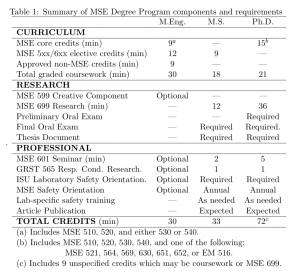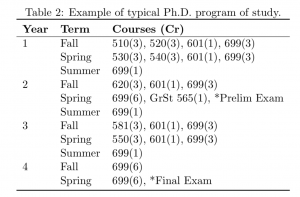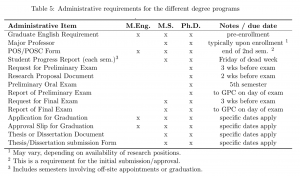1 Scope
This document outlines the responsibilities of students enrolled in any graduate degree programs within the Department of Materials Science and Engineering and the associated department policies and program-specific requirements. The requirements outlined here are in addition to those specified in the ISU Graduate Handbook. This document does not cover admission requirements or pre-enrollment procedures and does not cover postdoctoral research appointments.
2 Degree Programs and Requirements
The MSE department offers three graduate degrees, including thesis-based M.S. and Ph.D. degrees and a non-thesis M.Eng. degree. All degree programs are designed with curricular, research, and professional development components, as summarized in Table 1.
Academic offerings include an MSE core curriculum and a variety of elective and special topics courses. The research component involves independent and collaborative research, including the reporting of technical progress, presentation of results, and a rigorous ex- amination program. The professional components include a technical seminar program, a safety training program, training in equipment use, mentoring activities, participation in professional organizations, and appropriate public dissemination activities. Students work with their Major Professor to establish a customized program of study using the online POSC form. The timeline for program milestones and effort allocation will vary consid- erably between students, but typical plans of study for the different degree programs are shown in Tables 2 and 3.
2.1 Academic Degree Requirements
Minimum curricular requirements for each degree are listed in Table 1. Graduate students are required to maintain a cumulative GPA of 3.0 or higher out of 4.0 for all graduate coursework. Registration privileges may be suspended for any student who does not main- tain a satisfactory GPA. Requests for probationary removal of the registration hold must be submitted in writing to the Graduate Program Coordinator. The request should describe the circumstances of the case contributing to the sub-standard performance and should outline any steps to be taken that are intended to lead to improved outcomes. To qualify for the preliminary oral examination, Ph.D. students must earn a grade of ”B” or higher in each of the MSE core courses and must meet the GPA requirements listed in Table 4 at the time of application for the examination.
2.2 Administrative Program Requirements
All requirements of the Graduate College are specified in the ISU Graduate Student Hand- book. The MSE Graduate Program has several additional administrative requirements, as listed in Table 5. The program design and academic progress of each student is tracked using the online POSC form. The MSE Department requires this form to be completed and on file (electronically) by the end of the second semester of enrollment, but it can be updated throughout the program. In addition, thesis-based program students are required to complete a progress report form at the end of each semester, summarizing academic progress, research accomplishments, and professional development. Report forms will be discussed with the MP who will add comments before submission to the GPC. These forms will remain on file with the MSE Department and will be available for review by the POSC committee.
2.3 Concurrent Enrollment
The MSE Department offers B.S./M.S. and B.S./M.Eng. concurrent enrollment programs. Students accepted into a concurrent degree program may apply up to 6 credits of major or non-major graduate credit to both the B.S. degree and the relevant graduate degree (M.S. or M. Eng.). Admission to the B.S./M.S. program requires major professor sponsorship. Assistantships are not available for B.S./M.Eng. students. See the Graduate College Handbook for more details concerning application procedures.
- Eligibility – Undergraduate students who will have earned 90 credits toward the BS Mat E degree by the time of concurrent enrollment are eligible to apply for a concurrent program.
- Admission Requirements – All regular MSE Graduate Program admission criteria apply.
- Application Process – Applications for concurrent enrollment are not submitted through the Graduate College online application system. Rather complete (paper) application packages should be submitted directly to the MSE Graduate Program Coordinator. Applications are accepted anytime.
- Application Package – The application package must include the following materials.
- The ISU Concurrent Enrollment application form (“Concurrent Enrollment for Undergraduate Student Wishing to Pursue a Graduate Certificate or Degree”). See Reference (1).
- MSE Concurrent Enrollment Request form. See Reference (2).
- Resume/CV
- GRE test score report (include paper report and have scores transmitted electronically)
- Three letters of recommendation
2.4 Minor Program of Study
MSE graduate students in thesis-based programs are encouraged to enroll in an optional minor program of study. Requirements for minor programs are established by the home department for each program. The MSE Department offers a Minor in Materials Science and Engineering. The graduate minor requires 12 credits of MSE graduate coursework, including 6 credits selected from MSE 510, 520, 530, and 540. In addition, the minor pro- gram requires that the POS committee includes at least one member of the MSE Graduate Faculty.
2.5 Description of Program Responsibilities
Successful completion of any of our graduate degree programs requires an understanding of the roles and responsibilities of the student and various program officials. These are briefly described here, but students are encouraged to discuss these with their major professor, since expectations and standard practices may vary between research groups.
- The Director of Graduate Education (DOGE) is responsible for overseeing the ex- ecution of all graduate degree programs, ensuring that graduate examinations are properly conducted and that academic requirements are met upon conferring gradu- ate degrees. The DOGE will monitor academic progress through the POSC forms and departmental progress reports, and will engage in intervention activities, as deemed appropriate.
- The Graduate Program Coordinator (GPC) will facilitate program administration and will coordinate with other university officers on matters related to academic programs, assistantships, fellowships, international status, etc. The GPC will also serve as the primary administrative contact for students. All forms requiring DOGE signature/approval are to be submitted to the GPC.
- The Major Professor (MP) will serve as the principal student advisor for all matters related to research, academics, assistantships, and overall programmatic progress. The major professor will also serve as the primary evaluator of student performance and will be assisted by the Program of Study Committee and the MSE Graduate Program Committee. Under normal circumstances, the major professor is expected to meet with each graduate student individually for at least one hour per week to discuss research progress, professional development, and other issues as might arise with the student’s program. The MP is responsible for providing safe laboratory facilities and ensuring that the student has received proper training to perform work safely.
- The Program of Study Committee (POSC) is responsible for working with the MP to review proposal (Ph.D.) and thesis (M.S. and Ph.D.) documents and to conduct preliminary/final oral examinations. In addition, the POSC serves as a technical advisory board, available to provide advice, guidance, or recommendations regarding research activities, as appropriate. The POSC must be established using the on- line POSC form by the second semester of enrollment. Refer to the ISU Graduate Handbook for policies regarding the make-up of the POSC.
- The Graduate Research Assistant (GRA) is expected to engage professionally in the research activities assigned by the major professor. For a 1/2-time assistantship, a minimum of 20 hours per week of non-credit research is expected. More time may reasonably be expected under certain circumstances for fulfillment of commitments, as outlined by the MP. The GRA is expected to observe professional standards with regard to attendance and notification of absences, as directed by the MP.
- The Graduate Student (whether on assistantship or not) is expected to engage profes- sionally in academic coursework and curricular research assignments (MSE 699). Stu- dents are also expected to read, understand, and follow the administrative procedures outlined in this document and the Graduate College Handbook. Graduate students are responsible for completing all required safety training and providing/maintaining appropriate records of such training, as assigned by the cognizant MP or course in- structor. Students are expected to maintain the highest standards of integrity during academic, research, and reporting activities. Plagiarism, falsification, or misrepre- sentation of research results will not be tolerated.
3 Graduate Student Research
3.1 MSE Laboratory Safety Program
The MSE Department is heavily engaged in a wide variety of laboratory research, and the students, staff, and faculty collectively share the responsibility of maintaining the safest and most efficient environment in which to perform research of the highest quality. We take this responsibility very seriously, and every graduate student is required to participate fully the MSE Safety Program and to maintain appropriate safety training credentials. This in- volves various programs, courses, and seminars, along with formal university, department, and group-level training. Every student performing research will have a personalized safety training plan, supervised by the major professor. Students and major professors are re- quired to maintain safety training documentation consistent with the personalized plan and to review the plan and training documentation together every semester.
3.2 Laboratory Access and Usage
The professional and scientific development of our students is a high priority and requires that students have hands-on access to state-of-the-art research facilities. However, to main- tain safe working conditions and integrity of our research facilities and data, access to research equipment is generally limited to work that is directly related to thesis-based re- search or other contract research. Access to any laboratory space or use of any laboratory equipment must be expressly authorized by the student’s major professor and the specific lab or equipment supervisor. It is prohibited to give such access to unauthorized personnel or to leave doors unlocked or propped open. In addition, any known or suspected unautho- rized entry to laboratory spaces or use of equipment must be reported immediately to the MSE Graduate Program Coordinator, Safety Officer, or Director of Graduate Education.
3.3 Curricular Research (MSE 699)
Except for special circumstances approved by the DOGE (typically involving an off-campus assignment), students in thesis-based programs are required to enroll in at least one credit of MSE 699 during each semester, including summer. Curricular research assignments will be made at the start of each semester. Results will be evaluated and graded by the MP at the end of each semester. Generally, an effort of approximately 3 hours per week is expected during the semester for each semester-credit-hour awarded. This effort should be considered separate from other coursework and assistantship-related research.
3.4 Graduate Research Assistantships
Any MSE graduate student supported on a GRA will have a formal letter of intent (LOI) and position description (PD), both of which are signed by the student, the major professor, and the Department Chair or delegate. The LOI will describe the terms of the assistantship, including the start/end dates, the base-type of appointment (9-month or 12-month), the effort level (typically 1/4-time or 1/2-time), the monthly stipend, tuition support, the name of the major professor, the supporting project or scholarship accounts, leave policies, and other details or conditions of employment related to the specific research project and expected outcomes. The PD will describe the duties and responsibilities of the gradu- ate student, including academics, safety, administration, and research activities related to the specific research group, project, and laboratories involved. The PD document will be used by the major professor to evaluate the performance of the student each semester. It is critical that the student reads and understands the LOI and PD documents prior to signing.
Graduate students are eligible for various types of internal and external scholarships and fellowships, and they are encouraged to apply for these, as appropriate, under the supervision of the major professor. In most cases, the funding provided by scholarship and fellowship awards will serve to offset MSE stipend and tuition costs and will not be awarded in addition to the GRA stipend. There are a few exceptions, where awarded funds are intended to supplement the regular GRA stipend. Students are advised to read and understand the terms of scholarship and fellowship programs to avoid confusion.




